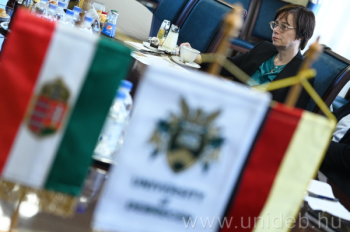
Enhancing International Collaboration: The Role of the University of Debrecen in Hungary’s Academic and Industrial Sectors
The University of Debrecen, a prominent academic institution in Hungary, continues to play a vital role in fostering international collaborations, particularly with German companies and diplomatic representatives. Such partnerships are crucial for advancing research, innovation, and the integration of students into the global labor market. Recent visits from high-profile figures such as the German Ambassador to Hungary highlight the importance of these relationships and underline the university’s commitment to strengthening academic and industrial ties.
Overview of the Visit by the German Ambassador to Debrecen
The recent visit of Julia Gross, the German Ambassador to Hungary, to the University of Debrecen, marked an important milestone in fostering bilateral cooperation. During her visit, she engaged with university leaders, faculty members, and students from the Institute of German Studies. This visit served as an opportunity to explore avenues for deeper collaboration and to showcase the university’s achievements in research, language training, and industrial partnerships.
Upon her arrival, the ambassador received a guided tour of the university’s main building, followed by a presentation outlining the university’s historical significance, program diversity in both Hungarian and English, and its extensive network of relationships with industry sectors. These interactions not only strengthen diplomatic ties but also serve to bolster Hungary’s position as a hub for international cooperation in higher education and technological innovation.
The Significance of Academic and Industrial Partnerships at the University of Debrecen
Fostering Innovation through Industry Collaborations
One of the core aspects highlighted during the ambassador’s visit was the university’s proactive engagement with industrial sectors, particularly German companies operating in Hungary. The university’s Faculty of Technology has established numerous collaborations, offering specialized internships and joint research projects tailored to meet current technological and industrial demands. These partnerships ensure that students acquire practical skills aligned with industry needs, enhancing their employability in both Hungary and Germany.
Furthermore, the university’s efforts in fostering innovation are evident through programs that encourage applied research, technology transfer, and startup incubation. Such initiatives are vital for creating a dynamic ecosystem where academia and industry collaboratively drive economic growth and technological progress.
Language and Cultural Cooperation
The role of the Institute of German Studies at the Faculty of Humanities is instrumental in bridging cultural and linguistic gaps. The German language programs, along with interpreters’, translators’, and teachers’ training, prepare students for careers in multinational companies, particularly German enterprises present in Debrecen and the wider region.
Ambassador Gross’s interest in the motivations behind students learning German underscores the importance of language skills in global business. The university’s emphasis on cultural exchange and language proficiency acts as a strategic asset for Hungary’s integration into the European and global markets.
Future Initiatives and Opportunities for Cooperation
Establishing a Technical Advisory Board
As a conclusion of the meeting, Rector Zoltán Szilvássy proposed establishing a dedicated technical cabinet to facilitate ongoing dialogue between academia and industry. This initiative aims to streamline collaboration efforts, share expertise, and coordinate joint projects, ultimately benefiting both students and local industries. The ambassador’s expressed interest in participating in this endeavor highlights the diplomatic support for sustained development.
Extending Diplomatic and Educational Ties
The visit also emphasized the importance of ongoing diplomatic support for academic exchanges. Julia Gross pledged her support for the German Academic Exchange Service (DAAD), advocating for the continued deployment of German-speaking lecturers and fostering student mobility programs. Such initiatives enhance intercultural understanding and expand educational opportunities for Hungarian students.
Implications for Students and Future Leaders
Students at the University of Debrecen stand to benefit significantly from these strengthened partnerships. Engagement with German companies provides access to internships, research projects, and potential employment opportunities after graduation. The university’s focus on intercultural competence and language proficiency prepares students to meet the challenges of an increasingly interconnected world.
Moreover, bilateral cooperation in research and industry opens pathways for students to participate in cutting-edge technological developments, contributing to Hungary’s innovation ecosystem. As the university continues to build on these relationships, it solidifies its reputation as a leader in academic excellence and industrial collaboration in Central Europe.
Conclusion: A Strategic Move Towards International Excellence
The visita of the German Ambassador to the University of Debrecen underscores the institution’s strategic importance in fostering international relations, industry partnerships, and academic excellence. By building strong ties with German corporate and diplomatic entities, the university is positioning itself as a regional hub for innovation, cultural exchange, and economic development. Students, faculty, and industry stakeholders alike benefit from these collaborations, paving the way for a prosperous future rooted in shared knowledge and mutual growth.
If you are interested in exploring related programs or collaborating with the University of Debrecen, learn more about their international initiatives and academic offerings. This vibrant university continues to serve as a bridge between Hungary and Germany, fostering cooperation that benefits all parties involved.

